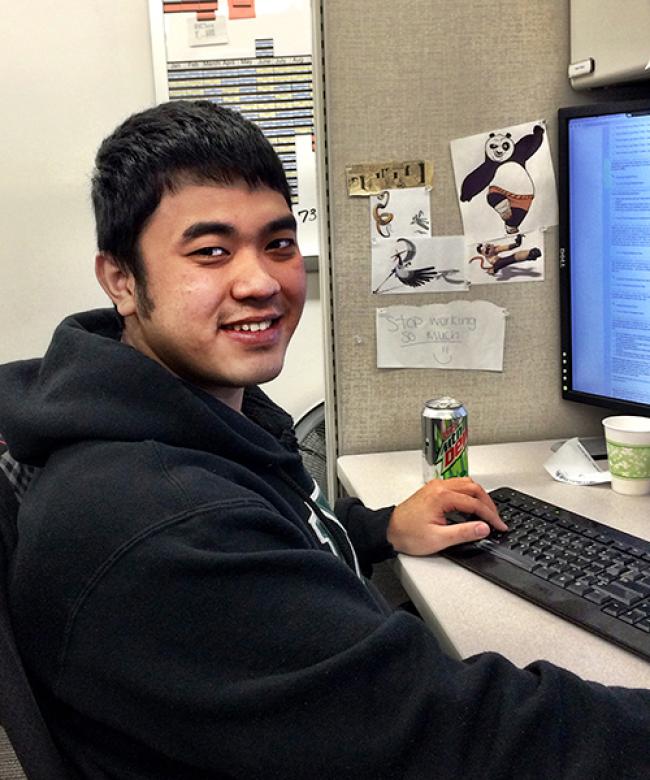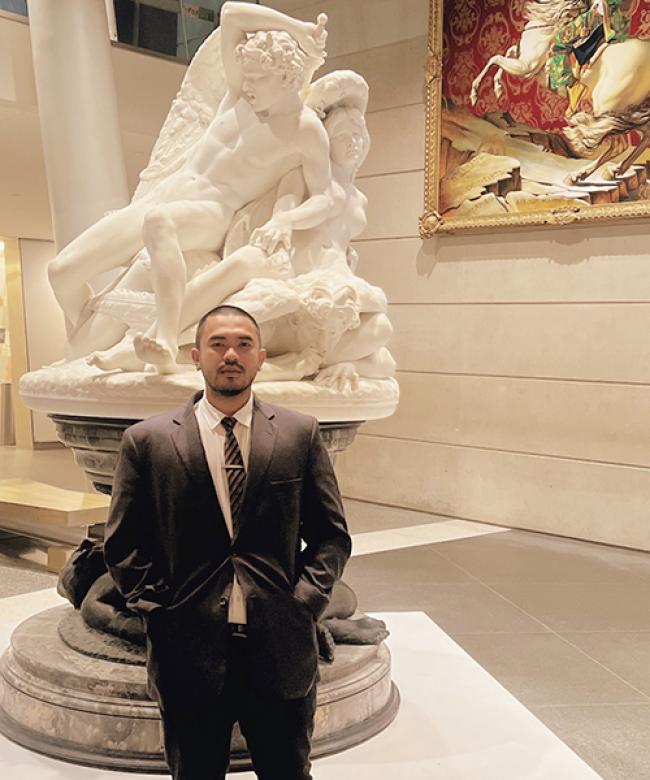Entrepreneur Khant (Robert) Latt ’14 at a recent Apex for Youth fund-raiser in Brooklyn, N.Y.
How to go from Augustana to Wall Street to your startup
When his country gained internet access in 2007, Khant (Robert) Latt started researching colleges. Until then he had limited information about the world outside dictator-run Myanmar, formerly Burma.
“Since I was a teenager I wondered, why we are different?" he said. "Are all countries outside the same as Myanmar? I was upset by the society and the way things were. I knew it was wrong, but I didn’t really have much context or knowledge of what’s out there.”
The first in his family to attend college, Latt began a pre-college program at the University of Melbourne, Australia, and from there he found Augustana in the American Midwest. He chose a political science major, planning on law school.
But plans change. During his first couple years at Augustana, Latt wasn’t a great student. But he did find family in his fraternity, Alpha Sigma Xi, which made his homesickness manageable.
Robert Latt (first row, second from the right) with his Alpha Sigma Xi fraternity
Over time, he realized he needed to change direction. So, he added a business administration major, concentrating in finance and management information systems (MIS), and landed an internship in Augustana’s EDGE Entrepreneurial Center. That gave him the edge he needed.
“It turned out to be the best thing I did in my life, for my career trajectory,” Latt said.
He reinvented himself in the EDGE Center. There, his classmate and friend Andy Shearouse ’15, now assistant director at the EDGE Center, taught him how to code.
“Most college students complain about homework,” Shearouse said, “but he was a year ahead of me in taking the MIS classes, so we had some deep discussions about managing business systems…. It was a great tradeoff.”
Latt graduated from Augustana in 2014 with two majors and valuable tech experience. He continued to St. Ambrose University across the Mississippi River, where he completed a master’s in IT management. He also completed an internship at then-named Deere Harvester Credit Union in the Quad Cities — and that’s what nailed it for Goldman Sachs.
But first things, first.

Robert Latt working in The EDGE Center
His first job out of graduate school was at Exelon in Chicago, as an IT auditor specializing in cyber security risk. Coming from a country that didn’t even have 24-hour electricity, he was surprised to learn that in the U.S., electricity is a commodity that is traded.
From Exelon he got a job as a senior IT auditor at the Federal Reserve in Chicago, where he learned about payment infrastructure and how payment works. He was recruited by Goldman Sachs for its investment management division, and moved to New York City in 2018.
“Not many people get that lucky,” Latt said. But even better than luck was his education and the knowledge of consumer banking he had gained from his credit union internship.
At Goldman Sachs he was part of some very savvy, creative, influential teams.
One team helped build and launch the digital consumer bank Marcus. He was also part of the team that partnered with Apple to create the Apple credit card.
Eventually, he was “itching to do something by myself.”
Latt was inspired by Goldman Sachs alumni who went out into the world to make a difference. For many of them that meant leading in the economic reforms of their home countries.
He returned to Myanmar in February 2020. He went to work in the office of a wealthy family investing in the technology sector.
But he didn’t feel at home. “I felt I didn’t belong there anymore, and I felt like a tourist,” he said. He returned to New York City in July 2020 and began his first startup.
He explained that during those earlier days of COVID, many people were cooking at home and selling it — very common behavior in Southeast Asia, and also among the Southeast Asians living in his neighborhood of Queens.
“So I started a platform that is like an Airbnb for food, where you can make something at home and other people can buy it from you,” he said. He took the startup through food safety compliances, and it became certified as a restaurant.
However, “food is tied to ethnicity,” he explained, and “it wasn’t scalable.” For example, “If you are Italian, you are likely to eat pasta more than tacos.”
That first startup lasted until January 2022. Latt and his team learned a lot from the experience.

Robert Latt at the Brooklyn Museum in New York
It comes down to a need for trust and accessibility.
“Why did we have 3,000 users who wanted to buy from people cooking at home?,” Latt asked. “Because they trusted our app.”
He realized that, in a world of options clouded by misinformation, people are overwhelmed with choices. He thought of how banks try to provide trust and accessibility, and “back in the day, accessibility meant branches and ATMs.”
As a previous Goldman Sachs teammate working on Marcus — “the first bank without a physical branch, the first digital bank, a consumer bank” — he knew something: “Accessibility is not branches or the ATM anymore. Accessibility is experience.
“When you use a product, how do you feel about it?” he noted. “How do you experience it? That becomes accessibility.”
Latt wanted to create a platform where people could recommend things they enjoy, and not be judged, as can happen on FaceBook or Instagram. Likewise, it could be a place for others to “find recommendations based on their taste and their constraints.”
So they pivoted from the first to the second startup.
But not so fast. Latt realized that — though he had the Goldman Sachs tech background and the startup background — if he “really wanted to compete with the Stanford and Harvard dropouts of the world in the startup space,” he needed to be more efficient and strategic.
To pay his bills, Latt was working remotely in critical infrastructure protection compliance for cyber standards for Northeast Power Coordinating Council. But what he really needed was more formal experience in building and launching products.
So he took a pay cut, and secured a job with JP Morgan Chase in wealth management for product strategy — a role mostly reserved for Ivy League graduates. “I was the only one from Augie, and with no MBA, but I had that startup experience,” he said.
His plan? To be there for six months and learn a lot. He didn’t want to deal with the hierarchy or the long time it takes to develop a project in the corporate world.
“In a startup, the goal is to build, create things that people want and people love,” he said. It requires a quick responsiveness to what people want right now.
His time with JP Morgan Chase made him a better leader, more capable of strategic decisions. Meanwhile, his two co-founders were working full-time on the startup.
One co-founder is a software engineer who was the first hire at Postmates, a $2.6 billion acquisition by Uber in 2020. The other is a NYU marketing-analytics grad who herself built a fast-fashion startup in Asia before attending NYU.
Together, the team built an app called LookFirst_NYC.
It’s a “discovery tool” for places to go and things to do in New York City.
Over its first four months, LookFirst_NYC with insightful restaurant reviews gained 2,500 members, primarily serving Midwestern tourists.
Latt said it works like a combo of Pinterest and Instagram; users can “pin” their favorites, and others can use the information based on their level of trust in the quality and the “social proof” — recommendations they look up to.
In developing LookFirst_NYC, Latt said he wanted to attract the Midwestern community. To him, people in New York City can seem more isolated than what he experienced in the Midwest.
“I want to recreate that feel,” he said. “That’s why I am specifically targeting Midwestern tourists — because I used to be one of them. Even though I might look different in terms of appearances, I am one of them at heart.”
LookFirst_NYC introduces Midwesterners to the most “magical experience” they can have in New York City. It also connects New Yorkers with Midwesterners in a new way.
Latt’s career path has included three countries, two internships, six jobs and two startups. It’s just one example of how an Augie student — a fairly typical one, in his ability to transform himself and his goals — is building his best success.
